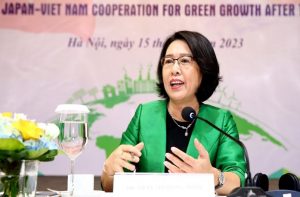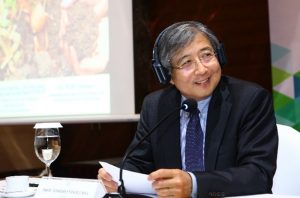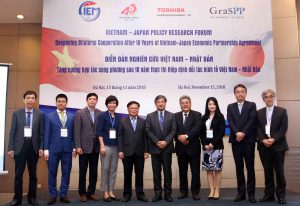Summary
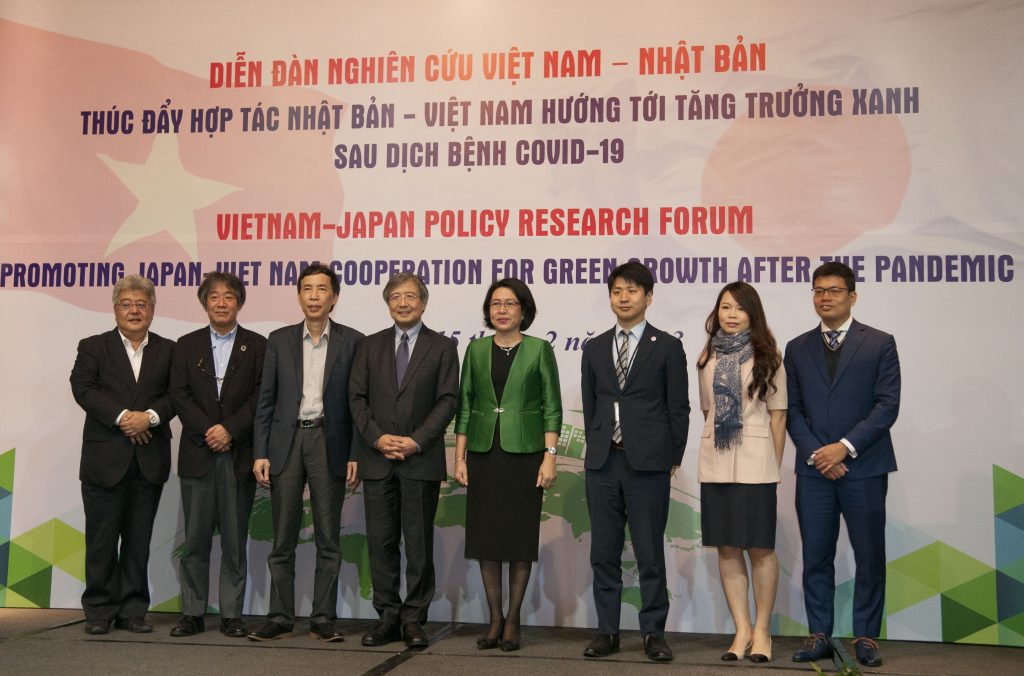
GraSPP has been working closely with Viet Nam’s Central Institute for Economic Management (CIEM) under the Ministry of Planning and Investment to enhance intellectual exchange between Japan and Viet Nam since 2015 with the financial support of the Toshiba International Foundation (TIFO). GraSPP and CIEM provide a summary of the discussion at the most recent workshop.
On February 15, 2023, GraSPP and CIEM hosted the Viet Nam-Japan Policy Research Forum Workshop 2023 titled “Promoting Japan-Viet Nam Cooperation for Green Growth after the Pandemic.” The workshop at the Pan Pacific Hotel in Hanoi, certified as a program to celebrate the 50th anniversary of establishing diplomatic relations between Japan and Viet Nam, attracted more than 70 participants from government, academia, business, professional associations, international organizations, and the media.
Background
Acknowledging the adverse consequences of climate change, all countries are working on plans to reduce carbon emissions along with efforts to heal the pandemic damages. In its economic restructuring process, Viet Nam also reaffirmed its commitment to reducing carbon emissions by 2030. In October 2021, the Government of Viet Nam approved “the National Green Growth Strategy for 2021-2030, vision towards 2050.”
While the strategy and government commitment are a welcome step in the right direction, Viet Nam needs to build capacity for green growth, including access to environment-friendly technology and adequate human resources. Against this background, Viet Nam must collaborate effectively with foreign partners and investors. Given economic ties and a shared understanding between the two countries on the importance of green growth, deepening cooperation with Japan is essential.
The workshop aimed to provide a platform for sharing experiences and perspectives on Japan-Viet Nam cooperation for green growth. A summary of the workshop discussion was shared with policymakers in Viet Nam.
The workshop was the eighth of the international workshops GraSPP and CIEM had jointly hosted since 2015.
Opening session
Dr. Tran Thi Hong Minh, President of CIEM, declared the workshop’s opening and illustrated the rapidly changing global and regional trends over the past years, especially emerging geopolitical tensions and the disruptive crisis due to the COVID-19 pandemic. President Tran Thi Hong Minh then described how Viet Nam, as a developing and highly open economy, suffered from many direct and indirect impacts of climate change and how proactive Viet Nam had been to mitigate such impacts. She continued that, to realize its commitment to net zero emissions by 2050, Viet Nam had introduced various policies and regulations to promote green growth and a circular economy with an emphasis on cooperation with international partners. As a leading economic partner for Viet Nam over decades, she added, Japan signed with Viet Nam in 2021 a cooperation agreement on low-carbon growth for 2021-2030 and implemented a comprehensive support program for the energy transition in Viet Nam through the Asian Energy Transition Initiative (AETI). President Tran Thi Hong Minh encouraged the speakers and participants to discuss the current development context and key trends and make recommendations, especially regarding the directions of Viet Nam-Japan cooperation, to strengthen green growth after the pandemic. She expressed special thanks to TIFO for financial support and GraSPP for its long-standing partnership with CIEM in organizing the annual series of Viet Nam-Japan Policy Research Forum workshops.
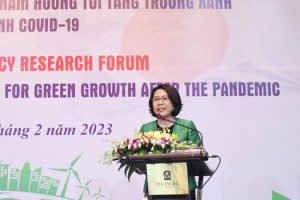
Mr. Kazuo Kusakabe, Chief Representative of Hanoi Representative Office of Toshiba Asia Pacific Pte Ltd, following his congratulatory address to the host organizations, highlighted that Viet Nam needed to continue promoting projects in support of green growth to achieve the carbon neutrality target by 2050 and address climate change adaptation. Mr. Kusakabe also gave an overview of Toshiba’s programs to promote green growth, such as those related to air quality, waste and wastewater treatment, and waste robot systems, among others, to promote sustainable and green growth as its business goal. He added that Toshiba was one of the leading suppliers of generators and thermal power plants while developing renewable energy and intelligent transportation systems.
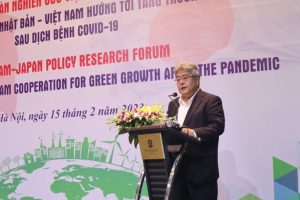
Prof. Toshiro Nishizawa from GraSPP shared his excitement to host Viet Nam-Japan Policy Research Forum’s annual dialogue offline for the first time since the outbreak of the COVID-19 pandemic and expressed appreciation to the TIFO for its long-standing generous support since 2015. Prof. Nishizawa described the world as full of persistent uncertainties and risks while referring to “polycrisis,” which had become a buzzword since the January World Economic Forum’s Davos summit. He continued that climate-change-related risks were one of the biggest threats facing us as part of polycrisis: “a cluster of related global risks with compounding effects, such that the overall impact exceeds the sum of each part.” Despite such dismal prospects, Prof. Nishizawa shed light on the two bright spots: a radical shift in recent years in the development paradigm toward a green economy and green growth and the enduring bilateral cooperation between Viet Nam and Japan for the past decades. Given these two bright spots, he encouraged the participants to exchange their thoughts and innovative ideas to enhance bilateral cooperation and address the global green agenda in challenging times.
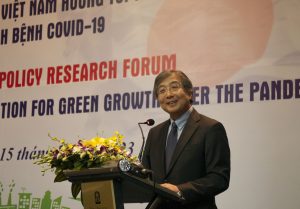
Session 1. Development context inducing efforts to promote green growth
Speaker: Dr. Vo Tri Thanh, President, Brand and Competitiveness Strategy Institute
Commentator: Prof. Toshiro Nishizawa, GraSPP, The University of Tokyo
Moderator: Dr. Tran Thi Hong Minh, President, CIEM
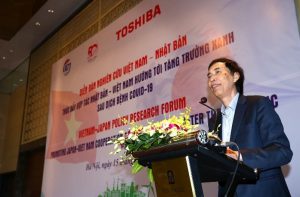
Dr. Vo Tri Thanh illustrated the mainstreaming of green, sustainable, inclusive, and creative development agenda in recent years and the challenges facing Viet Nam. He continued that many economies, including Viet Nam and Japan, had actively promoted green growth and sustainable development initiatives and incorporated green economy concepts into international cooperation agreements. Dr. Vo Tri Thanh pointed out that Viet Nam, one of the countries most affected by climate change, had implemented Green Growth Strategies since 2012 but achieved only three out of 12 targets for 2011-2020 without satisfactory spillover effects, suggesting difficulties in implementing such commitments.
Dr. Vo Tri Thanh considered the circular, digital, and blue economies and ensuing green growth essential for green economy and sustainable development. According to calculations by international organizations and the Ministry of Planning and Investment, he referred to Viet Nam’s potential need for additional funding of $368 billion to implement green transformation. Dr. Vo Tri Thanh concluded that to achieve the goal of net zero emissions by 2050, Viet Nam would need to strengthen international cooperation and find solutions to mobilize domestic and international capital.
Prof. Toshiro Nishizawa agreed with Dr. Vo Tri Thanh’s perspective on the global and regional trends toward a green economy and growth. He interpreted Dr. Vo Tri Thanh’s main thrust as describing changing perceptions in the development paradigm. He illustrated such perceptional changes as sustainable and inclusive development rather than mere economic growth, green rather than brown, or in other words, clean rather than dirty, green tends from physical to digital and from the market-dominance to the revival of the role of state and society.
Prof. Nishizawa emphasized the roles of government, enterprises, and markets in promoting a green economy and establishing an inclusive development model. He admitted that inadequate policy design remained prevalent while market pressure could change consumer behavior and increase competition. He, however, expressed concern about greenwashing and proposed that public policy needed to help reduce short-term trade-offs and profit-making incentives and, at the same time, increase social incentives toward a green economy. He concluded that the transformation cost might be high for the economy and businesses, but the process would create higher benefits in the long term.
Dr. Tran Thi Hong Minh agreed with Dr. Vo Tri Thanh about the achievements in sustainable development and challenges that Viet Nam would face in the coming years. She considered the Green Growth Strategy and Circular Economy Scheme as two basic foundations for green growth implementation in Viet Nam. She emphasized that a circular economy model had been in Viet Nam for a long time, especially in the agricultural sector, and a legal basis for developing a circular economy had been formulated. She added that CIEM was assigned a task to develop a draft decree on a circular economy in priority areas for submission to the government this year. Dr. Tran Thi Hong Minh illustrated how Viet Namese businesses had actively implemented the principles of a circular economy to balance economic and environmental benefits.
Session 2. Key areas enabling green growth in Viet Nam
Speaker: Prof. Tomonori Sudo, Ritsumeikan Asia Pacific University
Commentator: Dr. Doan Thi Thanh Ha, Economist, Economic Research Institute for ASEAN and East Asia (ERIA)
Moderator: Prof. Toshiro Nishizawa, GraSPP, The University of Tokyo
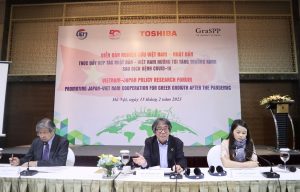
Prof. Tomonori Sudo praised Viet Nam’s proactive and active responses to climate change challenges as one of the most vulnerable countries to climate change. He shared his thoughts on the definition and approach of sustainable development while describing such key notions as environmental (natural and renewable) capital, economic capital, and social capital. He illustrated how environmental capital would be degraded if renewable capital is lower than demand and thus unable to contribute to enhancing economic and social capital. He suggested that sustainable development should ensure a conversion of environmental capital into economic and social capital, and green factors would be a new source of economic and social development. Prof. Sudo gave five keynotes for green growth: people and economies were directly affected by stress on natural resources and environmental risks; green growth would secure a more sustainable future and could lead to considerable economic and social benefits; green growth would require reconciling short-term priorities with long-term sustainable development goals; efforts on green growth were recent and still limited in scope; and a twin-track policy agenda was needed to guide national and international action on green growth in developing countries. Prof. Sudo concluded that green growth was theoretically ideal and viable, and Viet Nam had enough potential to grow by following a green growth path.
Dr. Doan Thi Thanh Ha highlighted the cost of pursuing green growth, especially in the context of developing countries. Dr. Doan Thi Thanh Ha then elaborated on some challenges for Viet Nam, such as the high ratio of unskilled labor force and raw materials exports. She questioned how to convert the unskilled labor force into a skilled workforce and how much it would cost. She illustrated that the production process of electric vehicles in Viet Nam could harm the environment with the lack of strict standards for environmental protection, unlike in developed countries. Dr. Doan Thi Thanh Ha concluded that an essential precondition for addressing the challenges facing Viet Nam would be to acquire knowledge and experience from other countries.
Session 3. Directions and recommendations for Japan and Viet Nam to deepen cooperation for green growth
Speaker: Mr. Nguyen Anh Duong, Director, Department for General Economic Issues and Integration Studies, CIEM
Commentator: Mr. Yoshitomo Kubo, Senior Representative, JICA Viet Nam Office
Moderator: Prof. Toshiro Nishizawa, GraSPP, The University of Tokyo
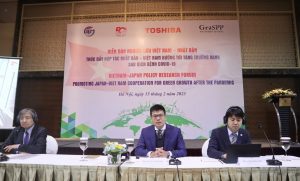
Mr. Nguyen Anh Duong pointed out that green recovery became imperative after the COVID-19 pandemic, but there emerged a risk of green growth becoming a tool of strategic rivalry across economies without coordinated efforts. He illustrated challenges facing the Asia-Pacific region, such as climate change, identified as one of the highest risks to growth and the supply chain disruption becoming more complicated after the pandemic and Russia-Ukraine conflict. He suggested that adapting the supply chain to sustainable development standards became essential.
Mr. Nguyen Anh Duong provided an overview of Viet Nam’s approach to promoting the achievement of sustainable development goals and green growth, such as the Green Growth Strategy in 2021, the National Action Plan on Green Growth in 2022, the Action Plan for Methane Emissions Reduction in Viet Nam by 2030 in 2022, and the Scheme on Promoting Circular Economy in Viet Nam in 2022, among others. Mr. Nguyen Anh Duong stressed that the essential factor in implementing projects was the budget and the development of a basic legal framework for project implementation. He concluded by proposing directions and orientations towards green growth and cooperation between Viet Nam and Japan, such as building capacity for improving related institutions, regulations, and policies for green growth, strengthening sustainable infrastructures in Viet Nam, promoting low-carbon global value chain, and cooperating to develop international conventions, rules and standards related to green growth, among others.
In response to Mr. Nguyen Anh Duong’s presentation, Mr. Yoshitomo Kubo emphasized the importance of green growth in Viet Nam, citing Viet Nam’s commitment at COP26 to achieving net zero emissions by 2050. He added that financing projects, especially investment in the renewable energy sector, would be beneficial for Viet Nam to respond to climate change challenges and achieve the SDGs through clean energy. Mr. Kubo also showed a few examples of JICA’s cooperation for low carbon green growth in Viet Nam, such as the green growth advisor project in Quang Ninh province, the onshore wind power project in Quang Tri province, and the capacity improvement project for power system operation.
Panel discussion: New directions and recommendations for Japan and Viet Nam to enhance cooperation in the Asia Pacific supply chain beyond COVID-19
Panelists:
Prof. Toshiro Nishizawa, GraSPP, The University of Tokyo
Prof. Tomonori Sudo, Ritsumeikan Asia Pacific University
Dr. Vo Tri Thanh, President, Brand and Competitiveness Strategy Institute
Moderator: Mr. Nguyen Anh Duong, Director, Department for General Economic Issues and Integration Studies, CIEM
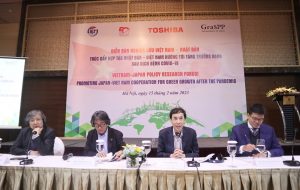
The panelists responded to the questions from the audience and shared their perspectives on the issues discussed in the sessions. Dr. Vo Tri Thanh contended that the world had been facing a debt crisis, posing difficulties for many countries, especially developing ones, and suggested that potential funding sources for green growth could be ODA, bonds, and investment funds. He suggested that Viet Nam should identify priority sectors for green transformation and consider these sectors as the drivers of the nation’s green growth and sustainable development. He added that priority sectors could be high carbon emissions industries, such as transport, manufacturing, and waste disposal. Dr. Vo Tri Thanh concluded that market pressures and technological revolution would increase investment capacity more effectively.
Prof. Tomonori Sudo shared his belief that the cost would be the most critical issue in considering when going green, but it would be necessary to consider the green transition as gradually taking place by converting fossil energy to renewable energy. He pointed out that the balance between building fossil and renewable energy plants would be roughly equal but needed to be reconsidered. To help Viet Nam mobilize investment from different sources, he added that companies or financial institutions should align loan appraisal for green projects to the ESG standards. Prof. Sudo gave a couple of examples of processing batteries in electric cars requiring rigorous technology by referring to China’s experience with supporting the electric vehicle battery waste treatment and Toshiba’s Carbon Dioxide Capture, Utilization and Storage System, which uses carbon dioxide to supply batteries to regenerate agriculture.
Prof. Nishizawa suggested that human resource development would play a vital role in green growth in developing countries because high-quality human resources would enable more effective absorption of the transferred technology.
Summary and concluding remarks
Dr. Tran Thi Hong Minh appreciated the attendance of all distinguished professors, speakers, commentators, and participants and emphasized that Japan and Viet Nam should strengthen bilateral cooperation to achieve green growth swiftly and more effectively after the COVID-19 pandemic. Prof. Nishizawa referred to intergenerational consideration in sustainable development and stressed that empathy for future generations would help our societies reconnect with the meaning of life in the global system and help us design a new global system needed to preserve a better economy and environment.
About the Forum
GraSPP has been working closely with Viet Nam’s Central Institute for Economic Management (CIEM) under the Ministry of Planning and Investment to enhance intellectual exchange between Japan and Viet Nam since 2015 with the financial support of the Toshiba International Foundation (TIFO). The workshop topics since 2015 are shown together with the speakers and moderators from Japan.
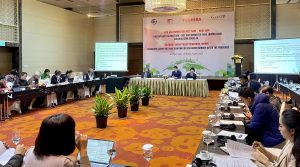
March 3, 2022 (online) | “Viet Nam-Japan Policy Research Forum—New Dynamisms in Asia-Pacific Supply Chains beyond COVID-19: Implications for Japan-Viet Nam Cooperation” (Prof. Fukunari Kimura, Keio University, Prof. Mie Oba, Kanagawa University, and Prof. Toshiro Nishizawa, GraSPP)
March 15, 2021 (online) | “Enhancing Viet Nam–Japan Cooperation for the Sustainable Energy Future in the Greater Mekong Sub-Region” (Prof. Fukunari Kimura, Keio University, Prof. Masahiro Sugiyama, The University of Tokyo’s Institute for Future Initiatives, and Prof. Toshiro Nishizawa, GraSPP)
November 22, 2019, in Hanoi | “How could Viet Nam and Japan Create Mutual Benefit?: Engendering Japan-Viet Nam Industrial Cooperation through Promoting Technology Transfer” (Prof. Kiyohiro Oki, The University of Tokyo’s Graduate School of Economics, Mr. Yasuhiro Yamada, Economic Research Institute for ASEAN and East Asia, and Prof. Toshiro Nishizawa, GraSPP)
November 15, 2018, in Hanoi | “Viet Nam-Japan Policy Research Forum: Deepening Bilateral Cooperation after 10 Years of Viet Nam-Japan Economic Partnership Agreement” (Prof. Mie Oba, Tokyo University of Science, Mr. Yasunori Onishi, Japan International Cooperation Agency, and Prof. Toshiro Nishizawa, GraSPP)
October 27, 2017, in Hanoi | “Exploring New Initiatives for Viet Nam-Japan Cooperation amidst Uncertainties in Asia-Pacific Economic Integration” (Prof. Shujiro Urata, Waseda University, and Prof. Toshiro Nishizawa, GraSPP)
March 2, 2017, in Hanoi | “Enhancing Inclusive Growth in the Context of Regional Integration” (Prof. Fukunari Kimura, Keio University, and Prof. Toshiro Nishizawa, GraSPP)
November 13, 2015, in Hanoi | “Partnership Opportunities for Viet Nam’s Successful Inclusion in ASEAN Economic Community” (Prof. Masahiro Kawai and Prof. Toshiro Nishizawa, GraSPP)


